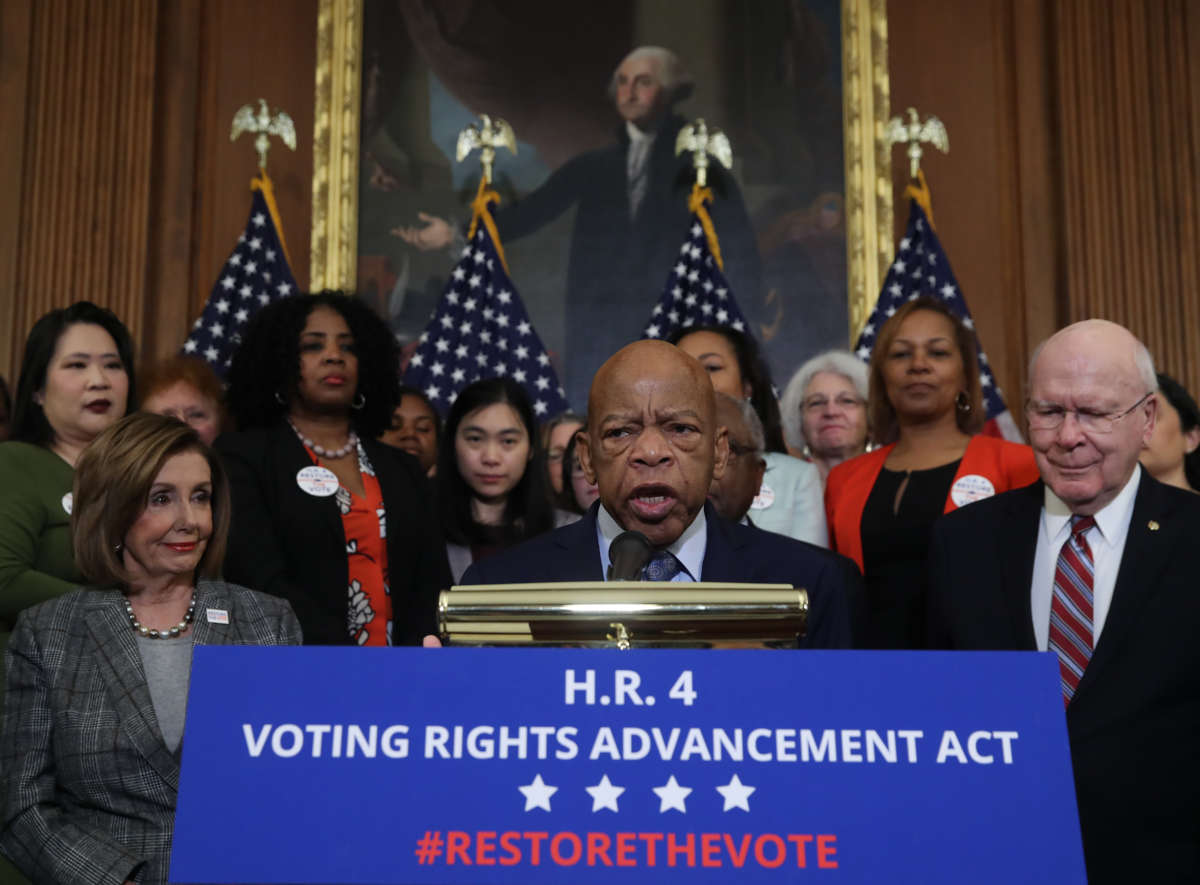Just one Republican—Rep. Brian Fitzpatrick of Pennsylvania—joined a united House Democratic caucus on Friday to pass what rights groups hailed as “historic” legislation to restore and expand voter protections that were gutted by the Supreme Court in 2013.
Lisa Gilbert, vice president of legislative affairs for Public Citizen, said passage of the Voting Rights Advancement Act (H.R. 4) is a “critical step” in combating Republican voter suppression efforts that have proliferated in the six years since the Supreme Court’s infamous decision in Shelby County v. Holder.
“Numerous state legislatures have undertaken targeted and deliberate steps to limit or impede the right to vote for communities of color, students, the elderly, and people with disabilities,” said Gilbert. “Americans who are eligible to vote but are denied that right due to fabricated or illegal barriers are being deprived of the full privilege of our democracy.”
BREAKING: The House just passed #HR4, one of the most important bills to emerge during this Congress. As voter suppression continues to spread across the US, this bill would breathe life back into the Voting Rights Act. A win for the people & a win for democracy! #RestoreTheVote pic.twitter.com/TR14b3ltxQ
— Kristen Clarke (@KristenClarkeJD) December 6, 2019
BREAKING: @RepBrianFitz is the one and only House Republican that believes in voting rights. https://t.co/37aqHMYIMO
— Public Citizen (@Public_Citizen) December 6, 2019
“If we want a true democracy, we must protect the right to vote for all,” said Rep. Pramila Jayapal (D-Wash.), co-chair of the Congressional Progressive Caucus. “The Voting Rights Advancement Act is critical to getting there.”
The legislation now heads to the Senate, which is controlled by Republicans. Senate Majority Leader Mitch McConnell (R-Ky.) has refused to allow a vote on Democrats’ For the People Act (H.R. 1), to which the Voting Rights Advancement Act was previously attached.
“To Majority Leader McConnell, we ask: why are you afraid of all Americans having their full right to vote?” Sylvia Albert, director of voting and elections at Common Cause, said in a statement.
As Ari Berman of Mother Jones reported, H.R. 4—sponsored by Rep. Terri Sewell (D-Ala.)—would “initially cover 11 states: nine in the South, plus California and New York, which have more recently been found to discriminate against Latinos and Asian Americans.”
“The bill would also require all states to get federal approval for election changes that are known to disproportionately affect voters of color, such as strict voter ID laws, tighter voter registration requirements, and polling place closures in areas with large numbers of minority voters,” Berman noted.
Vanita Gupta, president and CEO of The Leadership Conference on Civil and Human Rights, applauded the House for passing H.R. 4 and demanded that McConnell bring the bill up for a vote in the Senate as soon as possible.
“The passage of H.R. 4 in the House of Representatives today brings us one step closer to restoring the Voting Rights Act and undoing the tremendous damage of Shelby,” Gupta said in a statement. “The VRAA is too important—and the right to vote is too fundamental—to end up buried in the McConnell legislative graveyard.”
Unlike mainstream media, we’re not capitulating to Trump.
As a dizzying number of corporate news organizations – either through need or greed – rush to implement new ways to further monetize their content, and others acquiesce to Trump’s wishes, now is a time for movement media-makers to double down on community-first models.
At Truthout, we are reaffirming our commitments on this front: We won’t run ads or have a paywall because we believe that everyone should have access to information, and that access should exist without barriers and free of distractions from craven corporate interests. We recognize the implications for democracy when information-seekers click a link only to find the article trapped behind a paywall or buried on a page with dozens of invasive ads. The laws of capitalism dictate an unending increase in monetization, and much of the media simply follows those laws. Truthout and many of our peers are dedicating ourselves to following other paths – a commitment which feels vital in a moment when corporations are evermore overtly embedded in government.
Over 80 percent of Truthout‘s funding comes from small individual donations from our community of readers, and the remaining 20 percent comes from a handful of social justice-oriented foundations. Over a third of our total budget is supported by recurring monthly donors, many of whom give because they want to help us keep Truthout barrier-free for everyone.
You can help by giving today. Whether you can make a small monthly donation or a larger gift, Truthout only works with your support.
